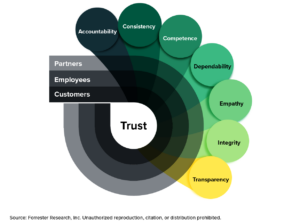Are B2B Buyers Cowards?
Buyers in B2B organizations are in a precarious position. They must make weighty financial decisions for their extended organization and on behalf of their colleagues. Unlike individual consumers, they must balance their personal risk tolerance — and, sometimes, their career prospects — alongside the interests of their employer. Making the wrong decision can have significant consequences.
Most Buyers Are Defensive Decision-Makers
Risk and trust loom large in the minds of B2B buyers and have a significant impact on how they act. One consequence is that buyers at B2B companies frequently make defensive decisions, selecting the safest choice over all other options. In Forrester’s Business Trust Survey, 2023, an astonishing 43% of B2B buyers admitted that they make defensive purchase decisions more than 70% of the time. While we doubt that the many business buyers who responded to our survey would identify as defensive or, perish the thought, cowardly, the numbers are clear: No matter how big a game a buyer talks, less than a third of all buyers are risk-tolerant (making <30% defensive decisions).
Risk Aversion Drives The Trust Premium
Trust is the remedy to risk. B2B buyers aren’t cowardly but rational and persistent. They understand the risks involved in making decisions on behalf of others, and they feel the weight of this responsibility. Trust bridges the gap between a risk-averse buyer and a potential vendor. Vendors must understand how B2B buyers think about trust and the factors that drive perceptions of trust. Why? Because trust pays: B2B buyers who trust a company are almost twice as likely to recommend that company externally or to pay a premium to work with that company than those who do not trust a company.
B2B Buyer Trust = Competence, Consistency, And Dependability
Forrester has identified seven levers, or dimensions, of trust that together explain how trust is created and sustained (see the figure below). The relative importance of the levers varies for different buyers in different circumstances. Understanding these levers and how buyers rely on them transforms trust from a hazy aspirational goal into a clear and actionable strategy. More specifically, our research shows that B2B buyers manage risk by prioritizing certain trust levers, namely competence, consistency, and dependability. These three levers are almost always the three primary drivers of B2B buyer trust across industries and geographies. They heavily drive perceptions of trust and mitigate perceptions of risk.
The Seven Levers Of Trust

Want More B2B Trust Insights?
Trust is an essential ingredient in the B2B buying process. Trusted companies are more likely to win and retain customers, receive the accolades of their peers, and enjoy a strong buyer preference. Read our recent report, The State Of Global Business Buyer Trust In 2024, to understand how to build and maintain trust and the factors that create trust bonds with B2B buyers.
